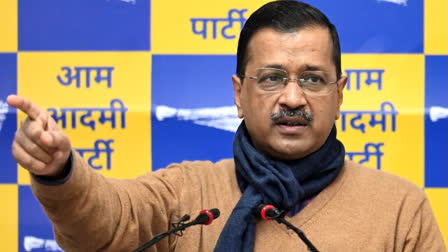New Delhi:A political crisis is brewing in the national capital, after the arrest of Delhi Chief Minister Arvind Kejriwal in the Delhi excise policy case, as the Aam Aadmi Party has asserted that Kejriwal would continue to discharge his duties, even if it requires him to do so from the jail.
According to constitutional experts, it is impossible for Kejriwal to run the government from jail--never happened before in the country--and if a new CM is not nominated it would result in an unprecedented constitutional break. The Constitution is silent on the impasse arising out of the arrest of a sitting Chief Minister, and when he has not named a successor, and there is no law which mandates him to resign after arrest. However, if the Chief Minister is convicted of an offence and is disqualified, then of course he can’t remain the Chief Minister, but till then he remains the Chief Minister.
Constitutional expert and former Lok Sabha Secretary General PDT Achary pointed out that the law is silent in such a situation. Speaking to ETV Bharat, he said, "There are four circumstances under which a Chief Minister resigns: loses the support of the majority, removed from the party, voluntarily resigns and in case of President’s rule”.
Achary said it is difficult to run a government from the jail, as a Chief Minister has to preside over the meetings, and how will he exercise supervisory power from the jail? “The files have to be moved to him and also the day-to-day functioning of the government…so, it is not possible to run the government from the jail”, said Achary.
Achary said if the Chief Minister is arrested then he has to designate someone to preside over Cabinet meetings and take important decisions. When asked historically no politician has run the government as a Chief Minister from the jail, senior advocate Rakesh Dwivedi said, “A government requires a Chief Minister in office and not in jail”, and questioned, how will Kejriwal carry out day-to-day functioning from the jail? Dwivedi emphasised that the Constitution doesn’t specifically state what should happen when a Chief Minister is arrested and has not named a successor. He pointed out that there is an element of public morality, which requires he should nominate someone in his place.
